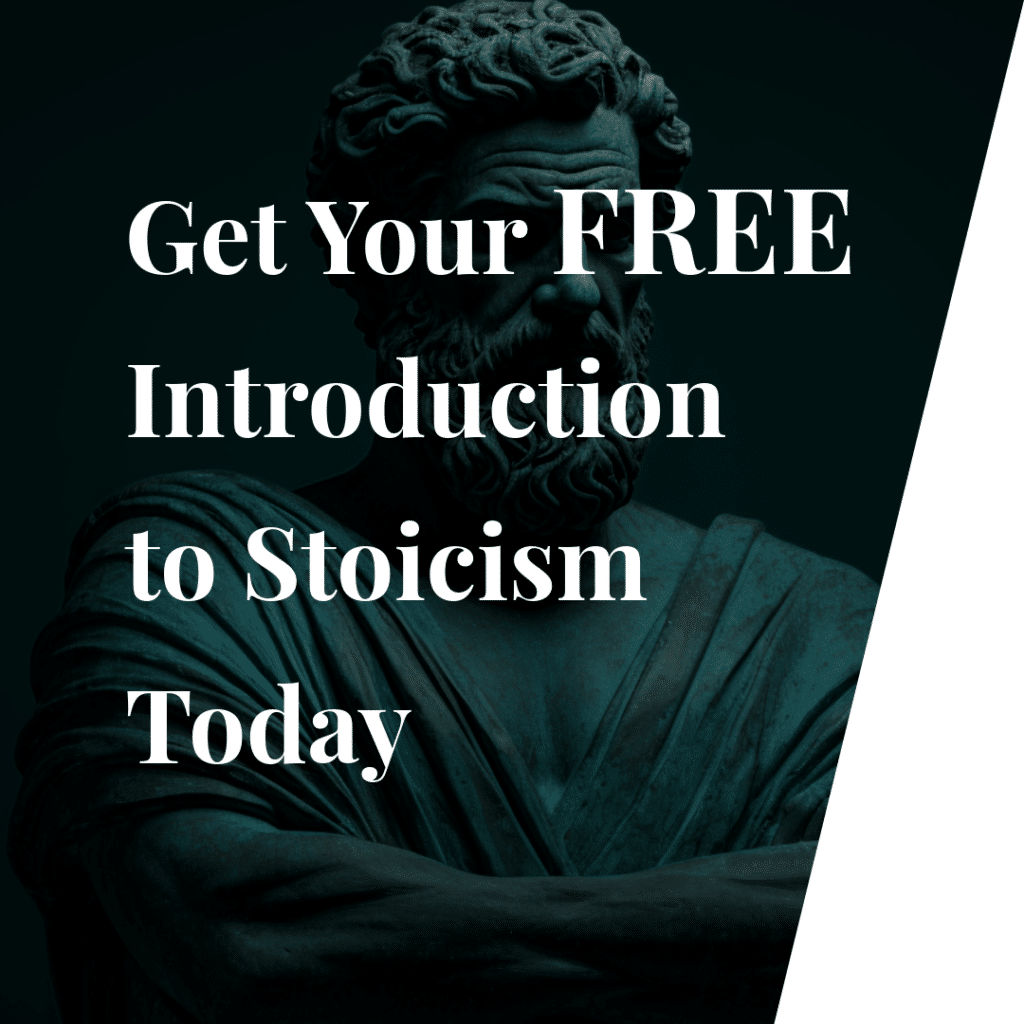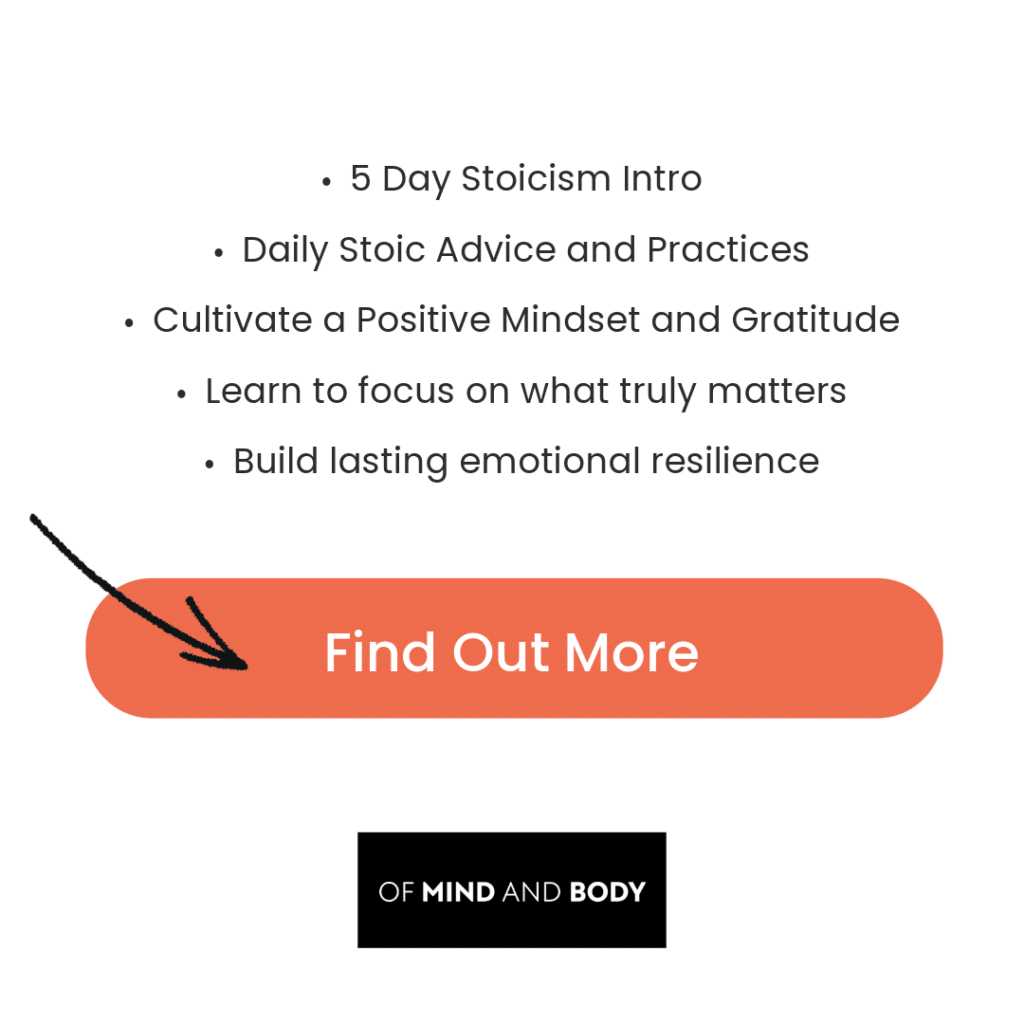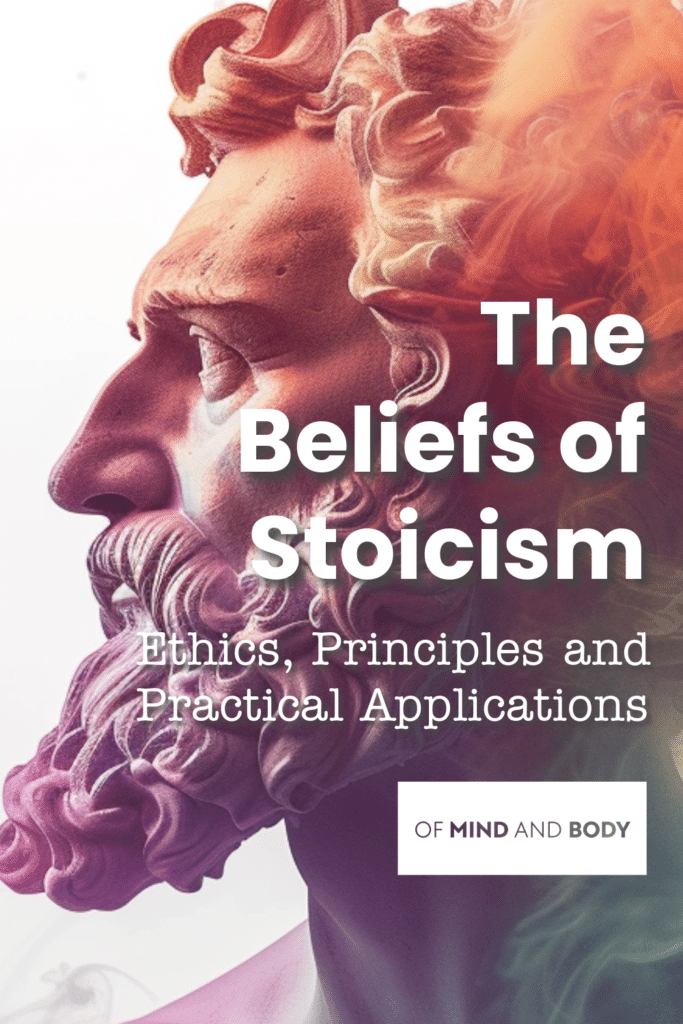
In an ever-changing and often challenging world, the ancient beliefs of Stoicism provide a beacon of clarity and strength. Originating in the bustling marketplaces of early 3rd century BC Greece, Stoicism has transcended time, offering wisdom that remains profoundly relevant today.
As we delve into the beliefs of Stoicism, we uncover not only its historical roots and key philosophers but also the core principles that can transform our understanding of happiness, virtue, and the human experience. From the streets of ancient Athens to the complexities of modern life, Stoicism provides timeless insights into leading a fulfilling and balanced life.

What is Stoic Philosophy?
Stoicism, a school of Hellenistic philosophy, emerged in the early 3rd century BC, founded by Zeno of Citium in Athens. It offers a distinctive blend of practical wisdom, ethical advice, and philosophical theory, focusing on personal virtue and wisdom as the path to true happiness. Stoicism teaches the development of self-control and fortitude as a means of overcoming destructive emotions; it posits that a sage, or ideally wise person, is immune to misfortune. The resilience of Stoicism comes from the beliefs that virtue is sufficient for happiness.
Historical Background
Stoicism was born in a period of turmoil and change, reflecting the challenges of living in the ancient world. It quickly spread from Greece to Rome, where it became immensely popular among all classes, from slaves to emperors. The philosophy was practised by those seeking practical strategies for leading a meaningful, ethical life in the face of the unpredictable and often chaotic nature of human existence.
Key Philosophers
Several philosophers stand out for their contributions to developing and spreading Stoic thought:
SENECA THE YOUNGER

– Seneca the Younger (c. 4 BC – AD 65), a Roman Stoic philosopher, statesman, and playwright, provided a vast array of moral essays and letters that delve into core Stoic beliefs about virtue, ethics, and the nature of the good life.
EPICTETUS
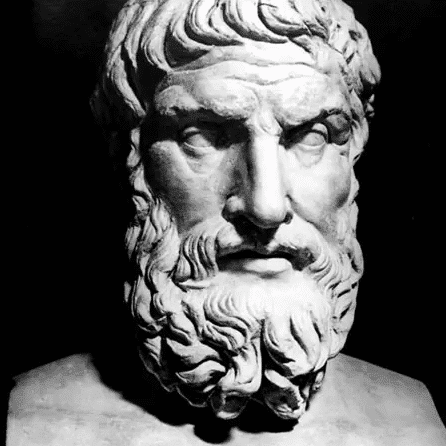
– Epictetus (c. 50 – c. 135 AD), born a slave, later became a prominent Stoic philosopher. His teachings, encapsulated in the Enchiridion and discourses, emphasise the importance of accepting what we cannot change and focusing on our own virtue and peace of mind.
MARCUS AURELIUS
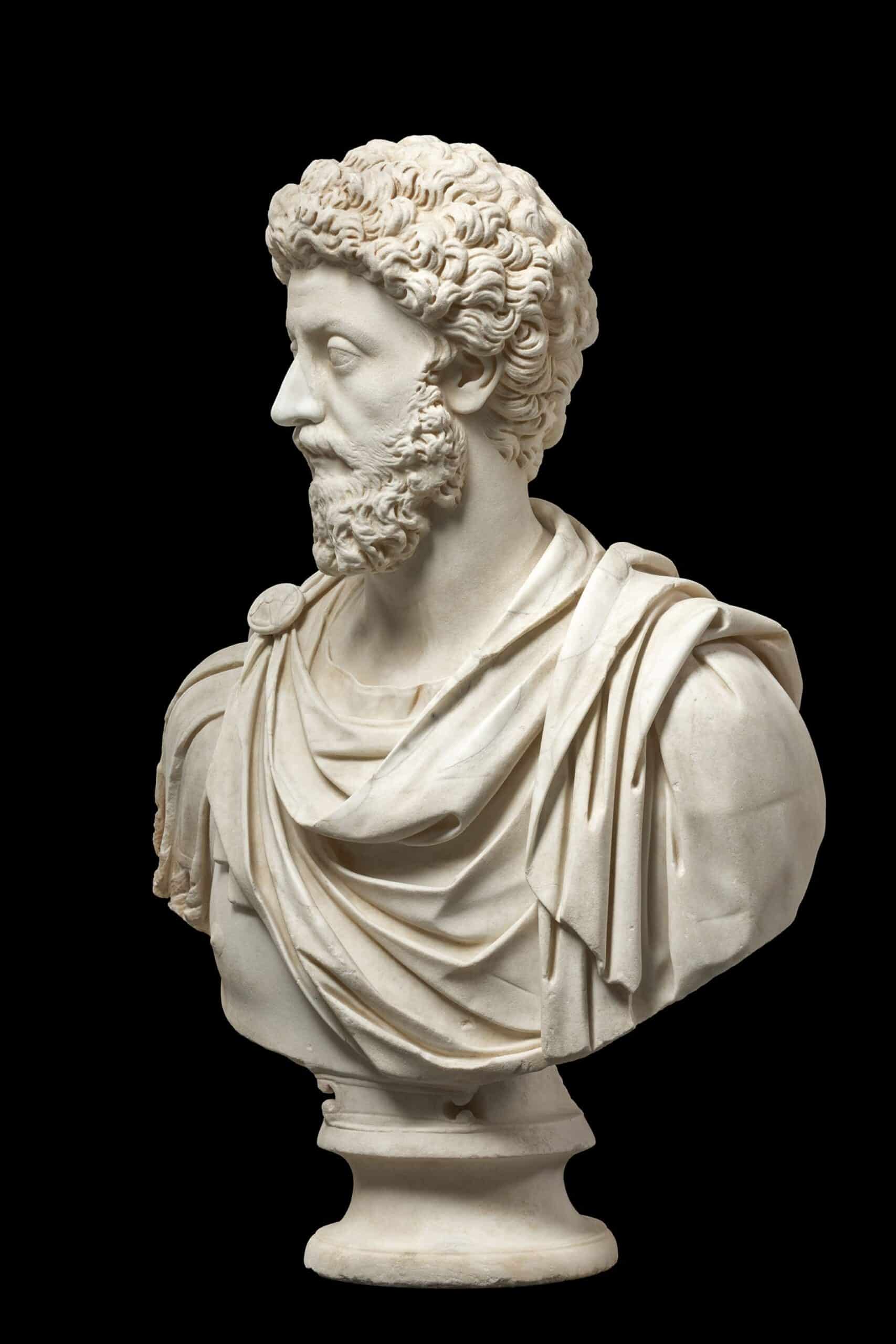
– Marcus Aurelius (AD 121 – 180), a Roman Emperor and Stoic philosopher, is best known for his work Meditations. This collection of personal writings offers insights into his philosophical and spiritual reflections, embodying the Stoic ideal of the philosopher-king.
Stoicism, with its rich historical background and influential philosophers, provides a robust framework for understanding human behaviour, ethics, and the pursuit of happiness. Its teachings on virtue, resilience, and the power of rational thought continue to resonate, offering timeless wisdom for navigating life’s challenges.
Core Beliefs of Stoicism: What do Stoics Believe?
At the heart of Stoic philosophy are several core beliefs that guide the way its adherents view the world, interact with others, and manage their own thoughts and emotions. These principles form the foundation of a Stoic way of life, aiming at achieving a state of inner peace and resilience.
Living in Harmony with Nature
Stoicism teaches that the universe is governed by a rational and divine order, and that living in accordance with this natural order is the essence of virtue. Stoic beliefs determine that everything in nature has a reason, and understanding this reason leads to a harmonious life. These beliefs in natural law guide Stoics to accept the world as it is, not as they wish it to be, fostering an attitude of acceptance and contentment.
Control and Acceptance
Central to the beliefs of Stoicism are the distinctions between what we can control and what we cannot. Stoics hold that our own perceptions, decisions, and actions are within our control, while external events are not. By focusing on our internal states and practising self-discipline, we can maintain tranquillity and avoid being perturbed by external circumstances. This emphasis on control and acceptance helps individuals to cope with adversity and maintain their composure in the face of life’s uncertainties.
Pursuit of Virtue
For Stoics, virtue is the highest good and the source of happiness. Virtue is defined as living in accordance with reason and consists of four cardinal virtues: wisdom, courage, justice, and temperance. Stoicism posits that by cultivating these virtues, one can achieve eudaimonia, a state of flourishing and fulfilment. The pursuit of virtue leads to a life of integrity and moral excellence, where happiness is derived not from external possessions or pleasures, but from living a life of moral rectitude.
Stoicism offers a compelling framework for understanding how to live well. Its focus on living in harmony with nature, prioritising internal over external control, and pursuing virtue over pleasure provides a road-map for achieving a fulfilling and resilient life. These core beliefs not only offer insight into the Stoic worldview but also offer practical guidance for navigating the complexities of modern existence.
The Role of Virtue in Stoicism
In the Stoic philosophy, virtue is not just a moral ideal but the very foundation of a good life. According to the beliefs of Stoicism, virtue alone is sufficient for happiness, which is a radical and empowering notion. This section delves into the Stoic concept of virtue, its importance, and its practical applications in daily life.
The Four Cardinal Virtues
Stoicism identifies four cardinal virtues, which are seen as the pillars of good character and ethical living. These virtues are:
WISDOM:
The ability to navigate complex situations in a logical, informed, and calm manner. It encompasses practical wisdom in decision-making and the discernment between good, bad, and indifferent things.
Courage:
Not just physical bravery, but the moral courage to stand up for what is right, to face fears, and to endure suffering with resilience.
Justice:
Involving fairness, kindness, and community-mindedness. It’s about treating others with respect, acting with integrity, and contributing to the welfare of the community.
Temperance:
The self-control and moderation in all aspects of life, ensuring that desires and passions do not distract from rational action or lead to excess.
Practical Applications
In practical terms, Stoicism teaches that by cultivating these virtues, individuals can lead lives of greater purpose and satisfaction.
For instance:
Wisdom: Guiding Choices Towards Values and the Greater Good
In Stoicism, wisdom is considered the master virtue, the one that enables us to recognise and choose the right path. It’s not just about knowledge or intelligence, but the practical application of this knowledge in real-life situations. Wisdom in Stoicism means:
- Making decisions that are not just beneficial for oneself, but also considerate of others and the community.
- Having the insight to see beyond immediate pleasures or pains, focusing on long-term wellbeing and ethical integrity.
- Understanding the nature of things, including the impermanence of life and the importance of living in the present moment.
- Practising discernment in distinguishing what is within our control and what is not, thereby reducing unnecessary worry and focusing our efforts where they matter most.
Courage: Facing Challenges with Resilience
Courage in Stoicism is more than just physical bravery; it’s about moral and psychological resilience:
- It involves facing life’s adversities with a calm and steadfast spirit, knowing that challenges are opportunities for growth.
- Courage means speaking up for what is right, even when it’s unpopular, and standing firm in your convictions.
- It includes the willingness to accept and confront personal fears and limitations, rather than avoiding or denying them.
- This virtue is about persevering through difficult times with hope and determination, not giving in to despair or pessimism.

Justice: Fairness and Empathy in Interactions
Justice is a central virtue in Stoic beliefs, emphasising our social nature and interconnectedness:
- It involves treating others with fairness, kindness, and understanding, recognizing the intrinsic value of all human beings.
- Justice means being honest, trustworthy, and respectful in our dealings with others, regardless of their status or relationship to us.
- It includes working towards the common good and considering the impact of our actions on the community and society at large.
- Practising justice also involves empathy, the ability to understand and share the feelings of others, leading to compassionate and ethical behaviour.
Temperance: Finding Balance and Moderation
Temperance is about self-control and moderation in all aspects of life:
- It’s the virtue that helps us resist excesses and impulsive behaviour, maintaining a balanced and rational approach to pleasures and pains.
- Temperance involves managing our desires and appetites, be it for food, drink, pleasure, or even work, ensuring that they don’t dominate our lives or lead us astray from our ethical principles.
- This virtue is about knowing when to say ‘no’ and exercising restraint, even in the face of temptation or pressure.
- Practising temperance leads to a healthier, more balanced lifestyle, and helps in developing self-respect and dignity.
Applying these virtues in daily life can transform challenges into opportunities for growth and lead to a more contented, resilient existence. The Stoic emphasis on virtue offers a timeless framework for personal development, emphasising the importance of character and ethical living in achieving true happiness.
Virtue and Eudaimonia
For Stoics, the pursuit of these virtues leads to eudaimonia, often translated as happiness or flourishing. This concept of happiness is distinct from momentary pleasures or emotional highs; it’s a deep and lasting state of well-being and fulfilment that comes from living a life of moral excellence. Eudaimonia is achieved through the consistent practice of the virtues, guiding one’s actions and decisions towards the good.
Stoicism on Mortality and Resilience
Stoicism provides profound insights into dealing with life’s most challenging aspects: mortality and adversity. By fostering a deep acceptance of life’s impermanence and cultivating resilience, Stoicism helps individuals navigate the inevitabilities of human existence with grace and composure.

Facing Life’s Impermanence
Stoics confront the reality of mortality head-on, recognising that life’s fleeting nature makes it precious. They advocate for a mindful appreciation of the present moment, encouraging us to live fully and virtuously without fear of death. This acceptance of mortality is not morbid but rather a call to lead a life of purpose and meaning, understanding that our time is limited.
Building Resilience
Central to Stoicism is the development of resilience, the ability to withstand and adapt to life’s challenges and changes. Stoic beliefs set forth that adversity is not only inevitable but also an opportunity for growth. By practising Stoic principles, one learns to detach from the emotional turbulence of hard times and to see obstacles as chances to practise virtue and strengthen character. This resilience is built through a combination of rational thought, emotional regulation, and a steadfast commitment to living according to one’s principles.
Overcoming Emotional Disturbances
The beliefs of Stoicism teach us that emotional disturbances arise not from external events but from our judgements about them. By re-evaluating our perceptions and beliefs, we can maintain tranquillity even in the face of life’s ups and downs. The Stoic practice of premeditatio malorum (the premeditation of evils) is a technique whereby one visualises potential challenges or losses to lessen the impact of future adversities. This mental preparation helps to foster emotional stability and prepare the individual for the realities of life.
Stoicism’s approach to mortality and resilience is both pragmatic and profound. It encourages a balanced perspective on life’s transient nature while advocating for strength, dignity, and composure in the face of adversity. This stoic mindset enables individuals to live more fulfilling lives, not in spite of life’s impermanence and challenges, but because of the wisdom and growth they bring.
Philosophical Differences: Stoicism in Contrast
Stoicism, with its unique perspectives on virtue, control, and the nature of happiness, stands in contrast to various other philosophical traditions. This section explores how Stoicism differs from Aristotelian ethics, compares it with other philosophical schools, and considers its place in modern interpretations.

Stoicism vs. Aristotelian Ethics
Aristotle’s ethics emphasise the concept of the “Golden Mean,” where virtue lies in the balance between two extremes of excess and deficiency. In contrast, Stoicism posits that virtue alone is sufficient for happiness and that external factors—wealth, health, and status—do not contribute to true happiness. While Aristotelian ethics focus on achieving balance and moderation in all things, Stoicism emphasises the importance of internal virtue and rational control over one’s perceptions and actions.
Stoicism and Other Philosophical Schools
Epicureanism vs. Stoicism
Epicureanism and Stoicism are both schools of Hellenistic philosophy that emphasise personal happiness, but their approaches differ significantly:
Epicureanism:
Founded by Epicurus, this philosophy advocates for the pursuit of pleasure as the highest good. However, it’s important to note that Epicurean pleasure is not about indulgence in sensual delights, but rather the absence of pain and turmoil. Epicureans seek a tranquil life (ataraxia) through the moderation of desires and the cultivation of friendships, knowledge, and a reflective life. Pleasure, in this sense, is about achieving a state of contentment and freedom from fear and physical discomfort.
Stoicism:
The beliefs of Stoicism, on the other hand, show us that virtue is the only true good and the source of happiness. Unlike Epicureans, who view external circumstances as significant to happiness (to the extent that they can cause or alleviate pain), Stoics argue that external events have no bearing on one’s inner peace and moral character. Happiness in Stoicism is found in living in accordance with nature, which means acting rationally and virtuously, irrespective of external conditions like pleasure or pain.
Cynicism vs. Stoicism
Cynicism and Stoicism share some common ground but diverge in their approach to living a virtuous life:
Cynicism:

The Cynics, most famously represented by Diogenes of Sinope, advocated for a life in accordance with nature, free from societal conventions and material possessions. They believed that virtue is the only necessity for happiness and often pursued this through extreme asceticism and rejection of societal norms. Cynics were known for their disdain for material wealth, social status, and established customs.
Stoicism:
While Stoics also value virtue above all, they do not advocate for the complete rejection of societal roles or possessions. Instead, Stoics emphasise living in harmony with society and fulfilling one’s duties. Stoicism teaches that external things like wealth or status are not inherently bad but should be used virtuously. Stoics strive to be socially engaged and responsible, living virtuously within the context of their community and relationships.
Scepticism vs. Stoicism
Scepticism and Stoicism offer contrasting views on knowledge and certainty:
Scepticism:

Sceptical philosophers, like Pyrrho and Sextus Empiricus, argued that certainty is impossible and that suspension of judgement (epoché) leads to tranquillity. They questioned the possibility of certain knowledge, believing that for every argument, an equal counter-argument exists. This approach leads to a state of perpetual inquiry, where definitive conclusions on ethical and metaphysical matters are avoided.
Stoicism:
In contrast, Stoics assert that certain knowledge is attainable through reason. Stoicism is founded on the beliefs that understanding the nature of the universe and living in accordance with its rational order is possible and essential for a virtuous life. Stoics rely on reason and logic to discern truths about the world and to guide moral and ethical decisions, believing that a well-reasoned life aligns with the natural order of the universe.
Modern Interpretations of Stoicism
In contemporary philosophy, Stoicism has been revisited for its practical applications in mental health, resilience training, and personal development. Modern interpretations often focus on Stoicism’s approach to emotional regulation, personal responsibility, and life’s challenges. While the ancient Stoics provided the framework, modern adaptations emphasise the applicability of Stoic beliefs to everyday life, from coping with stress to improving interpersonal relationships.
Stoicism’s enduring relevance lies in its ability to offer clear, pragmatic guidance on leading a virtuous, meaningful life. Its contrasts with other philosophical traditions highlight its unique approach to ethics, happiness, and the human condition.
Examples of Stoicism: Stoicism in Modern Context
In recent years, Stoicism has experienced a resurgence, offering a grounding counterpoint to the challenges posed by modern technologies. The constant buzz of social media has fragmented our attention spans and undermined our mental well-being and emotional resilience. The very interconnectedness provided by these technologies, while beneficial in many ways, has also exposed us to the turmoil of widespread opinions, leading to a polarising of public opinion.
In an era where external influences increasingly dictate our mental state, leading to a burgeoning mental health crisis, Stoicism emerges as a shining example of self-reliance and emotional fortitude. It champions personal responsibility and resilience, standing in stark contrast to the prevailing culture of victim hood.

The following examples of Stoicism show how Stoic principles can be integrated into everyday living, mental health practices, and professional environments.
Stoicism in Everyday Life
Stoicism teaches the value of focusing on what we can control and letting go of what we cannot, a principle that is immensely applicable in today’s society. For example, facing daily challenges—such as traffic jams, work deadlines, or interpersonal conflicts—with equanimity reflects Stoic wisdom. By choosing our responses to external events, we exercise our ability to maintain inner peace and resilience.
Stoicism and Mental Health
The Stoic practice of examining and reframing our thoughts has profound implications for mental health. Cognitive-behavioural therapy (CBT), a widely used psychological treatment, echoes Stoic ideas by helping individuals challenge and change unhelpful thoughts and behaviours. Stoicism’s emphasis on recognising the difference between our perceptions and external realities can empower individuals to manage anxiety, depression, and stress more effectively.
Stoicism in Professional Life
In the workplace, Stoicism offers strategies for navigating stress, conflict, and ambition. It encourages viewing obstacles as opportunities for growth and learning, fostering a mindset of resilience and adaptability. Practising Stoicism at work can mean maintaining integrity under pressure, dealing calmly with criticism, and leading by example through ethical and rational decision-making.
The timeless principles of Stoicism provide a framework for living with purpose, integrity, and serenity in the modern world. By embracing Stoic virtues, beliefs and practices, individuals can navigate life’s complexities with grace, contributing to their well-being and the betterment of society around them.
Stoicism Beliefs about Religion: The Stoic View of God and Fate
Stoicism offers a nuanced view of divinity and fate, intertwining these concepts with its ethical and philosophical teachings. This section delves into whether Stoicism can be considered a religion, its pantheistic elements, the reconciliation of determinism with free will, and the role of providence in the Stoic worldview.

Is Stoicism a Religion?
As we uncover the far reaching influence of Stoicism on the world of philosophy, we may find ourselves asking the question – is Stoicism a religion? While Stoicism is primarily a philosophy focused on ethics, beliefs, and personal virtue, its spiritual dimensions and reverence for nature often prompt comparisons to religious practices. However, Stoicism does not prescribe worship or adherence to specific rituals; instead, it emphasises an understanding of the universe’s rational order and aligning one’s life with this order. Stoicism encourages a personal and direct relationship with the world that is more philosophical than religious in the traditional sense.
Stoicism and Pantheism
Stoics often express a pantheistic view of the divine, seeing God or the divine reason (logos) as immanent in the world and in the natural laws governing it. This perspective suggests that everything is part of a coherent, purposeful whole, where the divine is manifest in the natural world. The Stoic sense of connectedness to the cosmos fosters a deep respect for nature and an understanding of oneself as a part of a larger, divine order.
Determinism and Free Will
Stoicism posits a universe governed by fate, where all events are determined by the divine reason. However, Stoics also assert the importance of individual agency and rationality. They reconcile determinism with free will by emphasising that while the external events of our lives are fated, how we respond to them—our judgements, desires, and actions—are within our control. This distinction underpins the Stoic approach to living virtuously in accordance with reason, regardless of external circumstances.
Stoicism and the Role of Providence
In Stoicism, providence refers to the rational and benevolent guiding principle of the universe. Stoic beliefs illustrate that the world is organised in a way that is ultimately beneficial for humanity, encouraging a trust in the unfolding of events as part of a larger, benevolent plan. This belief in providence helps individuals to maintain a positive outlook, even in adversity, trusting that there is a reason and purpose behind life’s challenges.
The Stoic perspectives on God, fate, and providence offer a framework for understanding the world that combines philosophical inquiry with a spiritual sense of belonging to a larger, ordered cosmos. This blend of thought and spirituality provides a unique approach to ethics and personal growth, emphasising harmony with the universe and a rational, yet deeply connected, way of living.
The Impact and Legacy of Stoicism
The influence of Stoicism extends far beyond its origins in ancient Greece and Rome, permeating Western thought and culture in profound ways. This concluding section highlights the enduring impact of Stoic beliefs, its contributions to religious traditions, and its continued relevance in contemporary society.

Influence on Western Philosophy
The beliefs of Stoicism have played a pivotal role in shaping ethical and moral theories throughout Western history. Its principles of virtue ethics, rationality, and personal integrity have influenced philosophers from the Renaissance to the Enlightenment and beyond. The emphasis on inner peace, ethical living, and resilience in the face of adversity has found echoes in various philosophical movements and has contributed to the development of modern existential and humanistic philosophies.
Stoicism in Christianity: Influencing Religious Traditions
Elements of Stoicism as been integrated into several major religious traditions, most notably Christianity. The Stoic ideals of the brotherhood of humanity, the moral call to love one’s neighbour, and the practice of forgiveness can be seen in Christian ethics, beliefs and teachings. Similarly, Stoic concepts have been paralleled in other religious and spiritual practices that emphasise mindfulness, compassion, and the pursuit of inner tranquillity.
Stoicism’s Relevance Today
In the contemporary world, Stoicism has experienced a resurgence as people seek guidance on coping with the complexities and challenges of modern life. Its practical advice on dealing with stress, uncertainty, and personal growth resonates with a wide audience, from business leaders and mental health professionals to educators and individuals seeking philosophical insights into living well.
The principles and beliefs of Stoicism, such as focusing on what we can control, accepting what we cannot, and striving to live virtuously, offer a timeless wisdom that is particularly applicable in today’s often unpredictable world. Stoicism provides tools for resilience, emotional intelligence, and personal empowerment, encouraging individuals to lead lives of purpose, dignity, and peace.

Conclusion
The legacy of Stoicism is a testament to its versatility, depth, and enduring appeal. Its impact on philosophy, religion, and individual lives underscores the universal human quest for meaning, virtue, and happiness. As we navigate the challenges of the 21st century, the ancient wisdom of Stoicism remains a guiding light, offering practical strategies for living with grace, courage, and tranquillity.
Final Thoughts
In our journey through the rich tapestry of Stoic beliefs, we’ve explored its profound principles, from the cultivation of virtue to the acceptance of life’s impermanence. Stoicism offers more than just philosophical insight; it provides practical tools for living a life of resilience, integrity, and tranquillity. As we face the complexities and challenges of modern existence, the timeless wisdom of Stoicism remains not only relevant but essential. Whether you’re seeking guidance for personal growth, emotional resilience, or ethical living, the beliefs of Stoicism have valuable lessons to offer.
If you’re intrigued by the idea of incorporating the principles of Stoic beliefs into your life, why not delve deeper? We invite you to sign up for our “5 Day Stoicism Introduction,” a carefully crafted journey that will introduce you to the core tenets of Stoicism, helping you to understand and apply these ancient yet ever-relevant ideas to your daily life. Embrace this opportunity to explore a philosophy that has shaped centuries of thought and practice, and discover how Stoicism can enrich your personal and professional life. Sign up here and embark on a transformative journey with Stoicism.



